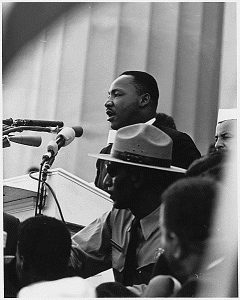From the desk of Jean Baker – Library Associate, Washington State Penitentiary
 I was sitting in the office yesterday and someone pointed to the hallway and said, “Look at all of the puppies”. I went out in the hallway and found about a dozen puppies spilling out of a basket and climbing over each other. Standing around in a circle were about 10 grown men some with tattoos and ponytails cuddling, petting and cooing at the little canines thus erasing the stereotype of tough convicts with a few simple gestures. The men told me they were about 3 weeks old and had every sort of coloring, black and white, brown and red, all brown, all white.
I was sitting in the office yesterday and someone pointed to the hallway and said, “Look at all of the puppies”. I went out in the hallway and found about a dozen puppies spilling out of a basket and climbing over each other. Standing around in a circle were about 10 grown men some with tattoos and ponytails cuddling, petting and cooing at the little canines thus erasing the stereotype of tough convicts with a few simple gestures. The men told me they were about 3 weeks old and had every sort of coloring, black and white, brown and red, all brown, all white.
The men and the puppies are residents, some for a longer period than others of Coyote Ridge Corrections Center (CCRC), a medium custody facility in Connell, WA. One of the prized jobs at CRCC is to be a dog handler. These men are very dedicated care-takers of their charges who are brought to the prison to receive training and socialization before being adopted out to families in the community.
This program is one of the many normalizing activities these inmates can experience to help them learn new behaviors and skills for when they can re-enter society. I was very excited to see this interaction of inmates and puppies while visiting the CRCC library. The library is located in the building where inmate programs are held and is a branch of the Washington State Library. The Institutional Services program of the State Library operates libraries in nine prisons and 2 mental hospitals in Washington.
I am the Branch Library Associate at Washington State Penitentiary and my visit was to assist newly hired CRCC Branch Library Associate, Justin Dickson with some final details of his training. The CRCC library is the newest and largest of the institutional libraries, opening in February 2009. At any time there can be 50-60 inmates using the library for one-hour periods. Justin has 4 inmate library clerks who handle patron customer service as well as shelving materials and keeping the collection in good order.
The library program at CRCC is another normalizing activities that is highly used and appreciated by the inmates. It is a neutral, comfortable environment which provides the opportunity to pursue interests, learn something new, find recreational reading and prepare for re-entry to the world outside the prison walls.






